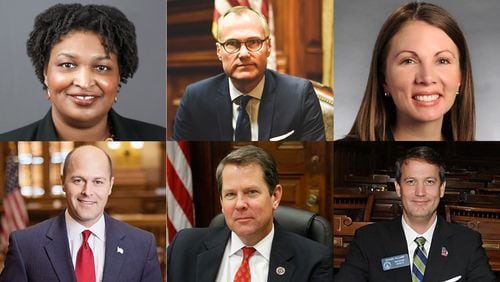It’s one of the toughest early decisions for a Georgia politician seeking higher office: resign from the seat to focus on his or her campaign, or stay put and forfeit three months that could have been spent raising cash and hitting the trail?
A wave of Georgia lawmakers running for bigger posts have stepped down from their seats in the state Legislature in the past few days, and several more face that question over the next weeks.
It’s not an easy one. The legislative session gives candidates a powerful pulpit to command attention and push their campaign priorities — and a daily opportunity to get in front of a legion of roaming TV cameras to raise their profiles.
But it also has significant drawbacks. State legislators and constitutional officers can’t raise campaign money during the 40-day legislative session, which spans from January through March and possibly longer, and every day at the Capitol means less time meeting voters or stumping at events.
The window to make that decision is narrow. Lawmakers can step down at any time they choose, but they only have a few more weeks to do so and guarantee their replacement is in office before the legislative session starts in January. A round of special elections for vacant seats was recently set for Nov. 7.
Two Atlanta candidates for governor have already stepped aside. Democratic state Rep. Stacey Abrams sent her resignation letter to Gov. Nathan Deal last week, and Republican state Sen. Hunter Hill said Tuesday that he was leaving his post. Republican state Rep. Geoff Duncan of Cumming, who is running for lieutenant governor, also resigned this week.
That still leaves plenty of politcos prowling the statehouse. Three other leading Republican candidates — Lt. Gov. Casey Cagle, Secretary of State Brian Kemp and state Sen. Michael Williams — have said they won't step down. It's unclear whether Democratic state Rep. Stacey Evans will do so.
Candidates for down-ticket offices face the same dilemma. Senate President Pro Tem David Shafer, the leading fundraiser in the race for lieutenant governor, said he intends "to do the job I was elected to do." It's not yet known whether state Sen. Rick Jeffares, another GOP candidate in the lieutenant governor's race, will stay in office.
Three Republican lawmakers running for secretary of state — state Sen. Josh McKoon and state Reps. Buzz Brockway and Brad Raffensperger — also must soon decide whether to stick around.
‘Go for it’
The stay-or-go conflict has led to much second-guessing. Republican Ed Lindsey felt his decision to stay in the Georgia House rather than step down to run for Congress in 2014 was the “politically smart” decision at the time — though he later came to regret it.
“Serving in the Legislature from January to March while running in a May primary for another office was simply too much,” said Lindsey, who finished fourth in the 11th Congressional District GOP primary. “There are simply not enough hours in the day to do both adequately. It is best to throw your proverbial hat over the wall and go for it.”
The latest openings have triggered a new round of crowded races for open legislative seats. At least three candidates are vying for Abrams’ Atlanta-based seat, a solidly Democratic district. And five contenders have filed paperwork to run for Hill’s seat, a stretch of north Atlanta and east Cobb County that has become one of the most competitive districts in the state.
At least three other legislative seats are open. Republican state Reps. Regina Quick and Chuck Williams, who both represent Athens-area districts, stepped down after they were appointed by Deal to jobs. And state Sen. Vincent Fort's Atlanta-based seat is vacant now that he's filed paperwork to run for mayor.
Those who resign often use their farewell statements to promote their campaigns and take a dig — implicit or otherwise — at their rivals.
Abrams, once the House’s top Democrat, used her resignation letter to thank her constituents, the governor’s office and a bipartisan group of lawmakers.
“Both in our work together and the lessons from our conflicts, we have demonstrated the importance of our system of government, to often put aside partisanship to work towards a better future and to learn from one another, despite our differences,” she wrote.
Others are sharper-edged. In his farewell statement, Duncan mentioned Shafer by name, pledging to expose corruption that he said has “permeated far too long under the Gold Dome” along with a vow that the Duluth Republican’s “political charade will soon be coming to an end.” In a statement, Shafer spokeswoman Emily Grosshans said it was “sad to watch Mr. Duncan stoop to insults and wild falsehoods.”
And Hill’s last dispatch from the state Senate included a parting shot at Kemp and Cagle for their decision to stay in office.
“Running for governor is a serious undertaking and one that deserves each candidate’s full commitment,” he said, adding: “Georgians don’t want candidates for governor putting their political careers ahead of the future of our state.”
For Cagle and Shafer, there are good reasons to stay in office.
Besides being able to promote their agendas, Cagle, as the Senate's president, and Shafer, as second in charge of the chamber, play a key role in deciding what legislation passes or dies. Lobbyists and special interests are well aware of that. No other candidates for governor or lieutenant governor have that kind of power.
The Atlanta Journal-Constitution reported in July that Cagle and Shafer are by far the favorite candidates of lobbyists, the special interests they represent and fellow lawmakers who need their support during the session. And resigning now would likely threaten some of those donations.
Cagle collected about $180,000 in contributions from lobbyists and statehouse political action committees in only a few months — about 10 times as much as the amount collected by the other candidates from those sources combined. The AJC reported earlier this year that a $2 million fund set up to push his agenda also got big money from lobbyists and special interests in late 2016.
Shafer attracted a similar crowd of donors, far outdistancing his opponents in the lieutenant governor's race.
With Cagle and Kemp, there is also a history of incumbents in statewide posts running for governor staying in office during their final session.
Lt. Gov. Zell Miller pushed during the 1990 session for a state lottery while running for governor, a race he won. Lt. Gov. Mark Taylor served as Gov. Sonny Perdue’s chief critic during the 2006 session while running unsuccessfully to unseat him.
And two recent Democratic secretaries of state — Cathy Cox in 2006 and Lewis Massey in 1998 — didn’t resign their posts as they campaigned for governor.








